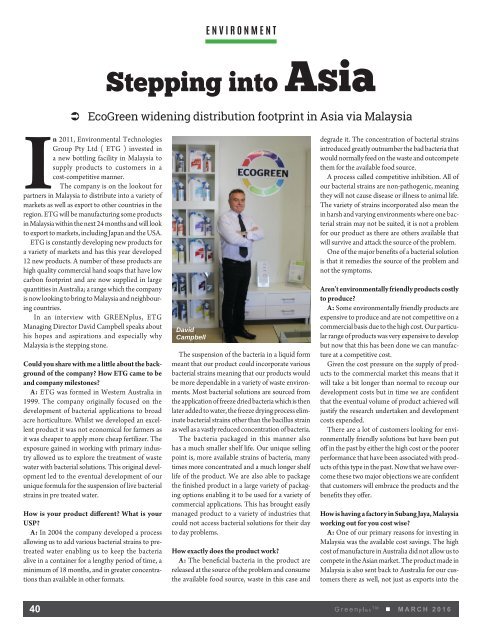Green Plus Issu 14
Create successful ePaper yourself
Turn your PDF publications into a flip-book with our unique Google optimized e-Paper software.
ENVIRONMENT<br />
Stepping into Asia<br />
Eco<strong>Green</strong> widening distribution footprint in Asia via Malaysia<br />
In 2011, Environmental Technologies<br />
Group Pty Ltd ( ETG ) invested in<br />
a new bottling facility in Malaysia to<br />
supply products to customers in a<br />
cost-competitive manner.<br />
The company is on the lookout for<br />
partners in Malaysia to distribute into a variety of<br />
markets as well as export to other countries in the<br />
region. ETG will be manufacturing some products<br />
in Malaysia within the next 24 months and will look<br />
to export to markets, including Japan and the USA.<br />
ETG is constantly developing new products for<br />
a variety of markets and has this year developed<br />
12 new products. A number of these products are<br />
high quality commercial hand soaps that have low<br />
carbon footprint and are now supplied in large<br />
quantities in Australia; a range which the company<br />
is now looking to bring to Malaysia and neighbouring<br />
countries.<br />
In an interview with GREENplus, ETG<br />
Managing Director David Campbell speaks about<br />
his hopes and aspirations and especially why<br />
Malaysia is the stepping stone.<br />
Could you share with me a little about the background<br />
of the company? How ETG came to be<br />
and company milestones?<br />
A: ETG was formed in Western Australia in<br />
1999. The company originally focused on the<br />
development of bacterial applications to broad<br />
acre horticulture. Whilst we developed an excellent<br />
product it was not economical for farmers as<br />
it was cheaper to apply more cheap fertilizer. The<br />
exposure gained in working with primary industry<br />
allowed us to explore the treatment of waste<br />
water with bacterial solutions. This original development<br />
led to the eventual development of our<br />
unique formula for the suspension of live bacterial<br />
strains in pre treated water.<br />
How is your product different? What is your<br />
USP?<br />
A: In 2004 the company developed a process<br />
allowing us to add various bacterial strains to pretreated<br />
water enabling us to keep the bacteria<br />
alive in a container for a lengthy period of time, a<br />
minimum of 18 months, and in greater concentrations<br />
than available in other formats.<br />
David<br />
Campbell<br />
The suspension of the bacteria in a liquid form<br />
meant that our product could incorporate various<br />
bacterial strains meaning that our products would<br />
be more dependable in a variety of waste environments.<br />
Most bacterial solutions are sourced from<br />
the application of freeze dried bacteria which is then<br />
later added to water, the freeze drying process eliminate<br />
bacterial strains other than the bacillus strain<br />
as well as a vastly reduced concentration of bacteria.<br />
The bacteria packaged in this manner also<br />
has a much smaller shelf life. Our unique selling<br />
point is, more available strains of bacteria, many<br />
times more concentrated and a much longer shelf<br />
life of the product. We are also able to package<br />
ing<br />
options enabling it to be used for a variety of<br />
commercial applications. This has brought easily<br />
managed product to a variety of industries that<br />
could not access bacterial solutions for their day<br />
to day problems.<br />
How exactly does the product work?<br />
A: <br />
released at the source of the problem and consume<br />
the available food source, waste in this case and<br />
degrade it. The concentration of bacterial strains<br />
introduced greatly outnumber the bad bacteria that<br />
would normally feed on the waste and outcompete<br />
them for the available food source.<br />
A process called competitive inhibition. All of<br />
our bacterial strains are non-pathogenic, meaning<br />
they will not cause disease or illness to animal life.<br />
The variety of strains incorporated also mean the<br />
in harsh and varying environments where one bacterial<br />
strain may not be suited, it is not a problem<br />
for our product as there are others available that<br />
will survive and attack the source of the problem.<br />
<br />
is that it remedies the source of the problem and<br />
not the symptoms.<br />
Aren’t environmentally friendly products costly<br />
to produce?<br />
A: Some environmentally friendly products are<br />
expensive to produce and are not competitive on a<br />
commercial basis due to the high cost. Our particular<br />
range of products was very expensive to develop<br />
but now that this has been done we can manufacture<br />
at a competitive cost.<br />
Given the cost pressure on the supply of products<br />
to the commercial market this means that it<br />
will take a bit longer than normal to recoup our<br />
<br />
that the eventual volume of product achieved will<br />
justify the research undertaken and development<br />
costs expended.<br />
There are a lot of customers looking for environmentally<br />
friendly solutions but have been put<br />
<br />
performance that have been associated with products<br />
of this type in the past. Now that we have over-<br />
<br />
that customers will embrace the products and the<br />
<br />
How is having a factory in Subang Jaya, Malaysia<br />
working out for you cost wise?<br />
A: One of our primary reasons for investing in<br />
Malaysia was the available cost savings. The high<br />
cost of manufacture in Australia did not allow us to<br />
compete in the Asian market. The product made in<br />
Malaysia is also sent back to Australia for our customers<br />
there as well, not just as exports into the<br />
40<br />
<strong>Green</strong>plus TM MARCH 2016


